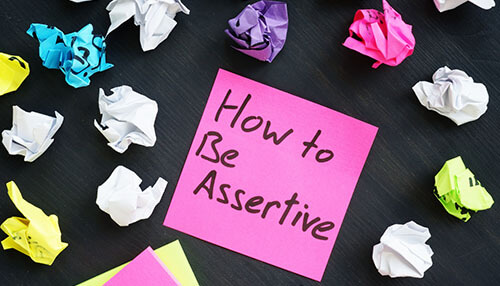Being assertive may be considered negative to other people because it may mean that you’re resisting their instructions or power. Moreover, to be assertive also means setting up boundaries and limitations from other people with the hopes that they won’t violate your space.
Suppose you think you lack assertiveness that puts your input aside from different places. In that case, this guide will help you become more assertive, establishing your confidence when communicating with other individuals.
Is being assertive a bad thing?
It’s definitely not a bad thing! You can be assertive as much as you can so you’ll protect yourself and exercise your freedom of speech. Being proactive can help you maintain your confidence because you trust and stand for yourself whenever something goes out of hand. Take note that if you’re excessively assertive, there may be consequences. Hence, you should mind your actions and words towards others, too.
How Can You Be Assertive?
1. Assertiveness Training Courses
If you want formal education to stand up for yourself, you can enroll in assertiveness training courses. You can’t really become assertive if you don’t have enough interaction and trust.
Furthermore, there are many types of training to be assertive, like knowing how to communicate and express yourself adequately. You can also choose a training course about boosting your self-confidence, which is a foundation for fighting for yourself in an unexpected or challenging situation.
2. Remember And Uphold Your Basic Rights
Whether outside your house or in the workplace, you must be aware of your principles in life to be firm in whatever you’re going to stand for. Your confidence and knowing your worth can help you become assertive when you’re being set aside or someone is trampling your rights.
Although knowing your rights isn’t enough to be assertive, you should remember that you should apply it in practice and exercise it. You shouldn’t restrain yourself just by studying it, but you also need to be confident that you’re on the right track whenever you stand for yourself.
For example, you already have many workloads. Hence, it’s your fundamental right to take some rest, which you can assert in your workplace.
3. Learn How To Say No
In reality, it’s difficult to say ‘no’ to some people, especially if you aren’t used to it and the person asking favors from you may be close to you. Knowing your limits and boundaries can help you work out your responsibilities and prior commitments because you know when to stop accepting favors from others.
Remember, you don’t need to please everyone and follow their favors just to satisfy their interests. You should stay guarded and be mindful of your energy and time whenever someone is going to ask favors. Sometimes, saying ‘no’ to people can prevent you from experiencing burnout.
4. Call Out Someone Positively+
Being assertive doesn’t mean that you’re going to be rude and straightforward towards the people you’ll give comments. If they have some wrongdoings or short lapses, you can talk to them nicely and assert what they need to correct for themselves.
Moreover, you should also be ready for their reaction if you assert something to them. The people you’ll correct may have a harmful or positive response, but make sure you’re open about it and expand your patience for them.
5. Mind Your Expressions And Be Physically Confident
Talking face to face isn’t the only way to assert yourself, but showing your emotions, physical posture, and confidence can also reflect how you assert yourself. Having authoritative body language makes you feel more confident and stronger during a challenging talk to individuals.
For example, you can straighten your back while talking to some people. Moreover, you should also maintain eye contact and a neutral expression on your face so the one you’re talking to can feel that you’re genuine with your concerns.
6. Choose When You Need To Be Assertive
Of course, you should know when to be assertive, particularly during challenging situations. It’ll help if you choose your battles wisely because there may be a misunderstanding between different parties if you’re going to be assertive all the time. You just need to keep in mind that you also need to understand other sides and meet them halfway.
Conclusion
Suppose you’re still having a hard time learning how to be assertive. In that case, you can always enroll in formal education or formal training to have good results. You will surely adopt those skills by being expressive and enhancing your communication skills.




